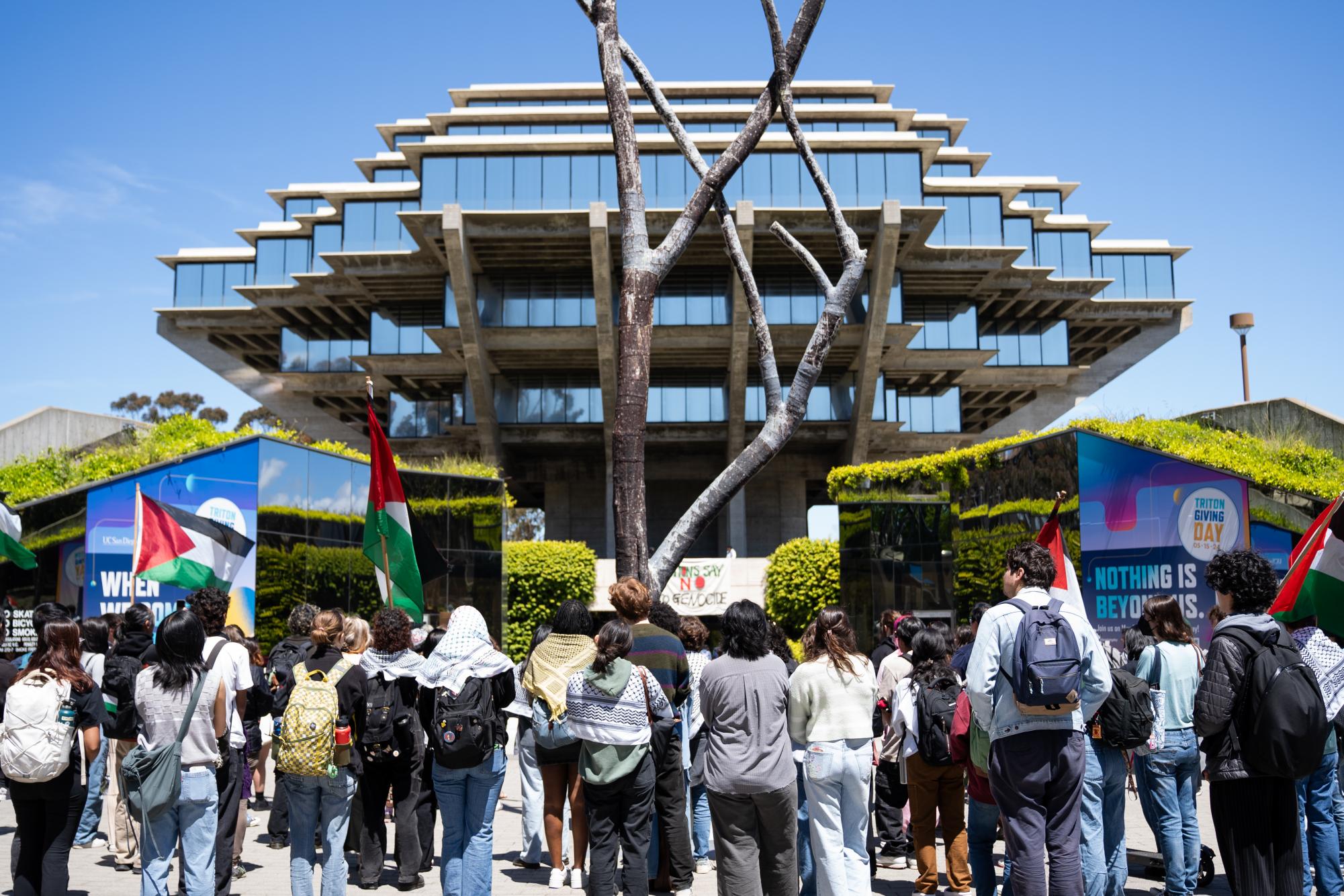On May 15, United Auto Workers Local 4811 voted to authorize a strike in response to the University of California’s handling of the pro-Palestinian encampments at UC Irvine, UCLA, and UC San Diego, with 79% of participating members voting in favor of the strike.
In November 2022, UAW Local 4811 authorized a six-week-long strike for increased wages and benefits for academic workers — the largest strike in the history of higher education, with 48,000 participants. The strike resulted in grade delays, canceled classes, and a period of general havoc that stretched across the 10 UC campuses. Now, it seems this historic movement will repeat itself on a smaller scale, but with one key difference: a concern of free speech. This recent UAW strike may not be traditional in the sense that it does not address labor concerns like fair pay or working hours, but it is entirely justified, given that the right to utilize free speech in the workplace is just as important as reasonable working conditions.
UC Santa Cruz is set to kick off the rolling strikes today, May 20. It will initiate a series of strikes at the UC campuses, each of which will be called upon to strike one at a time. Shortly after UAW announced the decision to strike, UC filed an unfair labor practice charge against UAW. In a previous statement, the UC Office of the President called the strike unlawful due to its purpose of advocating for free speech, rather than direct labor issues, and because it allegedly violates a “no strike” clause in a previously agreed upon contract between UAW and UC. If the strike is deemed unlawful, workers who participate could be dismissed with no chance of reinstatement to their jobs.
Despite the UC’s assertions that the strike is illegal, the actions of UCLA, UCSD, and UCI leadership — which include depriving workers of their right to protest their employment terms and refusing them the opportunity to collectively bargain — fully warrant retaliation and a reckoning with the consequences of their treatment of students. This strike is a message to the UC that students, both graduate and undergraduate, will not sit back and allow campus leadership to violate their First Amendment rights to freedom of speech and assembly.
UC’s claims surrounding the legality of the strike are questionable. In a letter sent to graduate students, UC warned that they consider this to be an unprotected strike and stated that the actions taken by universities to clear encampments were entirely separate from their relationship with UAW. But this claim does not seem to hold true when there are mountains of evidence that say that their actions are indeed a direct response to the encampments.
While the lawfulness of the strike is ultimately determined by the Public Employment Relations Board, UAW details specific university actions that classify this as an unfair labor practices strike, which is permitted under the “no strike” clause, according to the National Labor Relations Board. UC may uphold that it did not intend to impact UAW members, but their decisions to call law enforcement on their students indicate a deliberate effort to punish student workers who involved themselves in the protests. For example, UCSD instituted interim suspensions upon 40 graduate and undergraduate students involved in the encampment, thus suspending them from employment. This is a cruel punitive action that will almost certainly negatively impact these workers’ future opportunities, stunting both their ability to support themselves and their academic progress.
Under California’s Higher Education Employer-Employee Relations Act, employees within UC and the California State University system are entitled to collective bargaining, as well as protection from unilateral employment policy changes. UC failed to adhere to this act when UCLA canceled classes and moved to remote learning without consulting the union or offering them an opportunity to bargain, placing Teaching Assistants and Graduate Student Researchers in a position of uncertainty.
First, the UC stood by as counterprotesters violently attacked a peaceful encampment, then further escalated the situation by calling in police to arrest UC students, and is now threatening legal action against union members who choose to participate in a strike aimed at denouncing those very actions. UC has consistently tried to scare students into submission and pit them against pro-Palestinian protesters. Yet, it has consistently failed to do so. This UAW strike is just another example of students uniting under a common cause, not to advocate for better labor conditions as per the norm, but to condemn the UC system for its suppression of students’ First Amendment rights and blatant disregard for student safety when their political beliefs do not align with those of the university.
Nothing runs without the workers. Employees are the backbone of the UC system; they are essential to sustaining campus operations, and their contributions to academics and research are the reason the UC schools hold so much prestige. Carrying out a strike will force the UC to face the consequences of its actions and consider its students’ demands. Colleges across the country, and even within the UC system, have been able to come to agreements with student protesters. UC Riverside students peacefully dispersed their encampment after its chancellor agreed to disclose information on the school’s investments and form a task force to review how UCR uses its endowments. The University of Wisconsin-Milwaukee agreed to call for a ceasefire and meet with students to discuss requests for divestment and disclosure of ties with entities that have relations with Israel.
Protesters are reasonable — when they are met with respect, rather than hundreds of police in riot gear armed with rubber bullets and mace. Time and again, the UC has made the wrong decisions in its handling of pro-Palestinian protests, leaving UAW members with no other option but to strike in response to its disgraceful mismanagement. As long as UC continues to limit its students’ rights, students and workers alike will continue to fight back.










Pauli • May 20, 2024 at 11:39 pm
Are you the least bit curious how the protesters have made Jewish students feel on campus? The feedback I’ve received is they feel like the protesters are spreading an atmosphere of bigotry, threat and intimidation.